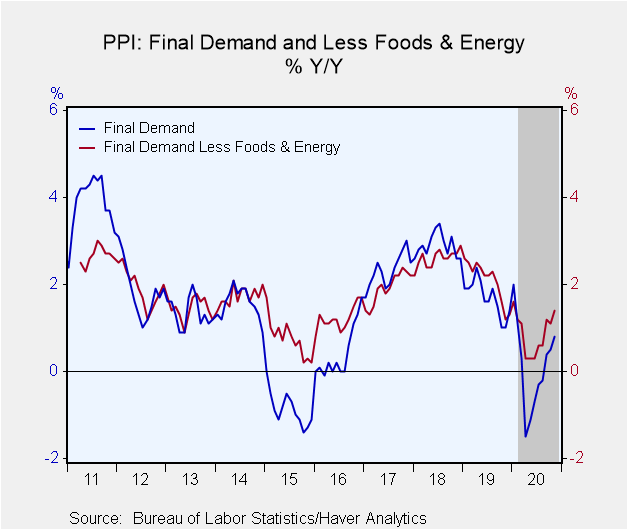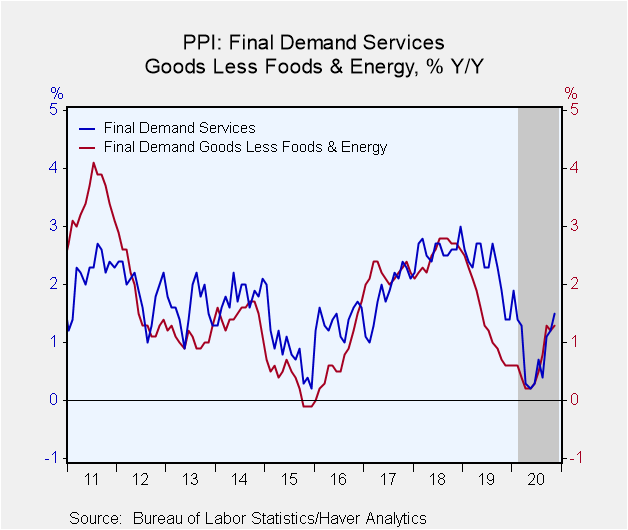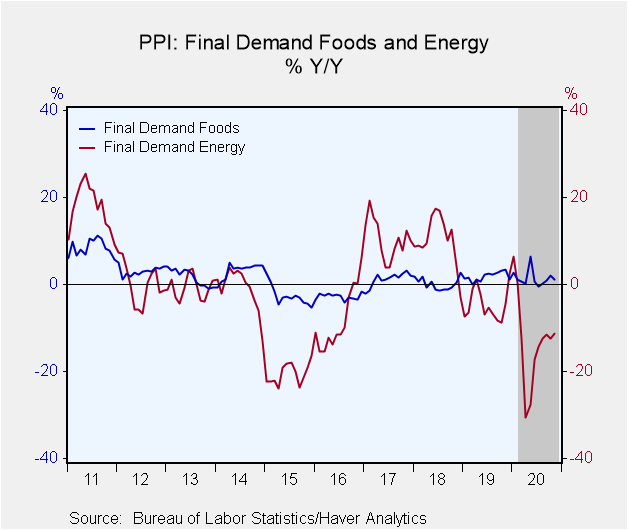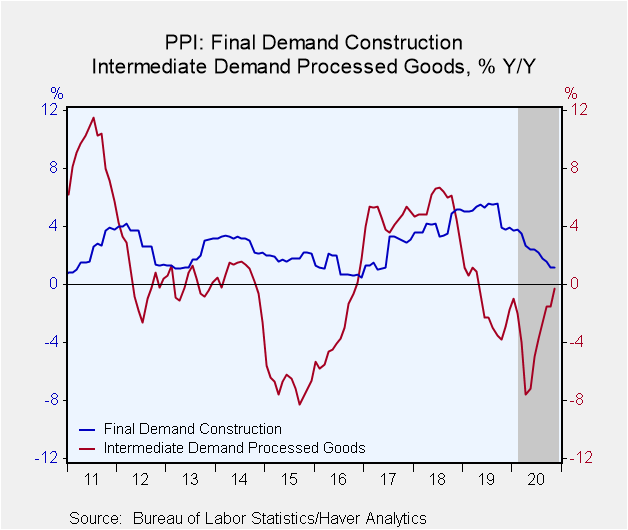 Global| Dec 11 2020
Global| Dec 11 2020U.S. Producer Price Index & Core Prices Increase Slightly in November
by:Tom Moeller
|in:Economy in Brief
Summary
• Food & energy prices are firm again. • Core goods prices rise moderately. • Service prices hold steady. The Producer Price Index for final demand rose 0.1% (0.8% y/y) during November following a 0.3% October gain. It was the [...]
• Food & energy prices are firm again.
• Core goods prices rise moderately.
• Service prices hold steady.
The Producer Price Index for final demand rose 0.1% (0.8% y/y) during November following a 0.3% October gain. It was the smallest of seven straight m/m gains and matched expectations in the Action Economics Forecast Survey. Underlying pricing power remained weak. Producer prices excluding food & energy edged 0.1% higher (1.4% y/y), the same as they did in October. A 0.2% increase had been expected. Another measure of underlying pricing power is the PPI excluding food, beverages and trade services. It also improved 0.1% in last month (0.9% y/y) following a 0.2% October gain. It also was the weakest increase in a half-year.
Energy prices strengthened 1.2% (-11.2% y/y) as natural gas prices increased 2.7% (5.0% y/y) and electric power costs rose 0.6% (0.7% y/y). A 1.9% decline (-29.9% y/y) in gasoline prices offset these increases as did a 0.6% easing (-44.4% y/y) in home heating oil prices. A 0.5% increase (1.2% y/y) in food prices accompanied these changes last month. Beef & veal prices rose 2.2% (-8.1% y/y) while egg prices declined 2.8% (NSA, -15.1% y/y). Dairy product prices strengthened 3.0% (1.2% y/y).
Final demand goods prices less food & energy improved 0.2% last month (1.3% y/y) following October's stability. Prices for finished consumer goods less food & energy improved 0.1% last month (1.3% y/y) after holding steady in October. Core nondurable goods prices rose 0.2% (1.6% y/y) for a second straight month. Durable consumer product prices edged 0.1% higher (0.9% y/y) following a 0.3% decline. Private capital equipment prices rose 0.2% last month and reversed the prior month's decline. The y/y change of 1.1% compares to a high of 2.9% in January of 2019. Government purchased goods prices rose 0.1% (1.0% y/y) after improving 0.2%.
Services prices for final demand were unchanged in November (1.5% y/y), down from a 0.5% August rise. Trade services prices fell 0.3% (+3.1% y/y) following two months of 0.2% increase. The cost of trade of finished goods also fell 0.3% (+3.1% y/y) after rising 0.2%. Transportation & warehousing services prices declined 0.9% (-4.6% y/y) after surging 1.1%. Excluding these costs, trade services prices improved 0.2% (1.3% y/y) after a 0.1% rise.
The cost of construction edged 0.1% higher (1.2% y/y) following stability in October.
Intermediate product prices strengthened 1.4% (-0.3% y/y) following a 0.3% rise as processed fuel prices jumped 6.0% (-5.1% y/y).
The PPI data can be found in Haver's USECON database. Further detail can be found in PPI and PPIR. The expectations figures are available in the AS1REPNA database.
| Producer Price Index (SA, %) | Nov | Oct | Sep | Nov Y/Y | 2019 | 2018 | 2017 |
|---|---|---|---|---|---|---|---|
| Final Demand | 0.1 | 0.3 | 0.4 | 0.8 | 1.7 | 2.9 | 2.3 |
| Excluding Food & Energy | 0.1 | 0.1 | 0.4 | 1.4 | 2.1 | 2.6 | 1.9 |
| Excluding Food, Energy & Trade Services | 0.1 | 0.2 | 0.4 | 0.9 | 2.0 | 2.9 | 2.1 |
| Goods | 0.4 | 0.5 | 0.4 | -0.8 | 0.4 | 3.4 | 3.4 |
| Foods | 0.5 | 2.4 | 1.2 | 1.2 | 1.8 | 0.2 | 1.2 |
| Energy | 1.2 | 0.8 | -0.3 | -11.2 | -4.4 | 10.1 | 10.6 |
| Goods Excluding Food & Energy | 0.2 | 0.0 | 0.4 | 1.3 | 1.4 | 2.5 | 2.2 |
| Services | 0.0 | 0.2 | 0.4 | 1.5 | 2.2 | 2.6 | 1.8 |
| Trade Services | -0.3 | 0.2 | 0.2 | 3.1 | 2.5 | 1.8 | 1.5 |
| Construction | 0.1 | 0.0 | -0.2 | 1.2 | 4.9 | 4.1 | 2.2 |
| Intermediate Demand - Processed Goods | 1.4 | 0.3 | 1.0 | -0.3 | -1.4 | 5.4 | 4.7 |
Tom Moeller
AuthorMore in Author Profile »Prior to joining Haver Analytics in 2000, Mr. Moeller worked as the Economist at Chancellor Capital Management from 1985 to 1999. There, he developed comprehensive economic forecasts and interpreted economic data for equity and fixed income portfolio managers. Also at Chancellor, Mr. Moeller worked as an equity analyst and was responsible for researching and rating companies in the economically sensitive automobile and housing industries for investment in Chancellor’s equity portfolio. Prior to joining Chancellor, Mr. Moeller was an Economist at Citibank from 1979 to 1984. He also analyzed pricing behavior in the metals industry for the Council on Wage and Price Stability in Washington, D.C. In 1999, Mr. Moeller received the award for most accurate forecast from the Forecasters' Club of New York. From 1990 to 1992 he was President of the New York Association for Business Economists. Mr. Moeller earned an M.B.A. in Finance from Fordham University, where he graduated in 1987. He holds a Bachelor of Arts in Economics from George Washington University.
More Economy in Brief
 Global| Feb 05 2026
Global| Feb 05 2026Charts of the Week: Balanced Policy, Resilient Data and AI Narratives
by:Andrew Cates










